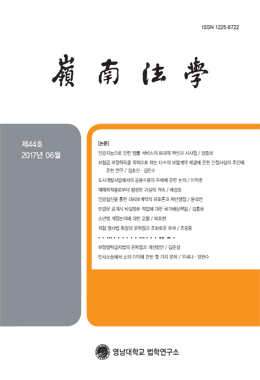형법 제7조 제·개정 당시의 입법취지 및 “죄를 지어 외국에서 형의 전부 또는 일부가 집행된 사람”에 대해서만 적용하도록 규정하고 있는 문언내용에 따르면, 현재로서는 외국에서 무죄판결을 받기 전까지의 미결구금은 국내선고형의 산입대상이 될 수 없다고 보는 전면부정설의 입장을 취할 수 밖에 없다. 그러나 외국에서의 미결구금을 형법 제53조 작량감경으로 처리할 수 있다는 대상판결 다수의견에 대해서는 작량감경은 형법 제7조의 입법취지와도 부합하지 않으며, 1회만 할 수 있을 뿐이어서 다른 감경사유가 존재할 경우 반영할 수 없다는 문제가 발생한다는 점에서 동의하기 어렵다.
미결구금과 형의 집행사이에는 그 목적이나 기능면에서 차이가 있으므로, 미결구금과 형의 집행이 실질적으로 같은 것이라는 대상판결 반대의견의 전제는 문리해석의 관점에서 받아들이기 어렵다.
법률의 흠결이라는 유추적용을 하기 위한 전제조건을 충족하지 못하고 있다는 점에서, 형법 제7조의 유추적용이 가능하다는 유추적용긍정설의 논지 또한 수긍하기 어렵다.
직접적용가능설은 입법취지 등을 고려하여 형법 제7조를 직접 적용할 수 있다고 주장하나, 형법 제7조의 입법취지가 무엇인지 확실하게 밝히지도 않고 있다. 이 부분은 앞서의 유추적용긍정설에 대한 비판이 그대로 적용된다.
“형법 제7조의 직접 적용이 가능하다고 해석하는 것이 책임원칙에 부합하는 것이다.”라는 주장은 일반론적 관점에서는 타당하며, 원칙적으로 동의한다. 그러나 피고인의 자백 등 여러 가지 사정을 감안하여 피고인의 책임에 부합하는 형을 부과했다고 볼 수도 있으므로, 외국에서 무죄판결을 받기 전까지의 미결구금을 국내선고형에 산입하는 것이 책임원칙에 부합한다는 주장이 대상판례의 사안에도 그대로 작동될 수 있는지 의문이다.
직접적용가능설은 “비교법적 관점에 비추어 보더라도 외국에서 무죄판결을 받기 전까지의 미결구금을 국내 선고형에 산입하는 것이 바람직하다”고 주장한다. 그러나 독일형법 제51조 제3항 등에서는 외국에서 무죄판결을 받기 전까지의 미결구금일수를 새로운 선고형에 산입하는 명문규정을 두고 있는 반면, 우리 형법 제7조에는 이런 명문규정이 없다는 점에서 서로 다르다. 따라서 이 논지 역시 형법 제7조의 직접적용에 대한 근거가 되기에는 부족하다.
결론적으로 형법 제7조에서 정한 ‘외국에서 형의 전부 또는 일부가 집행된 사람’에 외국법원에 기소되어 무죄판결을 받기 전까지 상당 기간 미결구금을 당한 사람은 포함되지 않으며, 외국에서의 무죄판결을 받기 전까지의 미결구금일수도 국내선고형에 산입할 수 없다. 따라서 현행 형법 제7조는 외국에서 무죄판결을 받기 전까지의 미결구금을 외국에서 집행된 형으로 보아 이를 국내선고형에 산입할 수 있는 직접적용 또는 유추적용의 근거가 될 수 없다고 보는 것이 문언에 합치되는 해석이다.
외국에서 무죄판결을 받기 전까지의 미결구금은 국내선고형의 산입대상이 될 수 없다는 것이 대상판결 다수의견의 입장이다. 따라서 실질적 이중처벌로 인한 피고인의 불이익을 완화하기 위해서는 향후 미결구금 등 기타의 자유박탈적 강제처분도 국내선 고형에 필요적으로 산입될 수 있도록 형법 제7조를 재개정할 필요가 있다.
The key issue in Supreme Court en banc Decision 2017Do5977 Decided August 24, 2017 was whether the criminal defendant could be granted relief by counting either the whole or partial number of days detained pending trial abroad toward the sentence to be declared in Korea through application of Article 7 of the Criminal Act.
The first opinion is the theory of non-application of Article 7 of the Criminal Act. According to the Majority Opinion of the subject case, the number of days detained abroad should not be counted toward the sentence to be declared in Korea through direct and analogical application of Article 7 of the Criminal Act.
The second opinion is the theory of analogical application of Article 7 of the Criminal Act. According to the Dissenting Opinion of the subject case, the pre-trial detention executed abroad and sentence executed abroad were substantially identical, the legislative purpose of Article 7 of the Criminal Act should be sufficiently taken into consideration, that is, protecting a criminal defendant’s personal liberty to the fullest by mitigating the risk of inordinate punishment of the defendant facing double punishment at home and abroad. And associating pre-trial detention executed abroad with sentence execution rather than sentencing ground through analogical application of Article 7 of the Criminal Act.
The third opinion is the theory of direct application of Article 7 of the Criminal Act. According to this theory, Article 7 of the Criminal Act could be literally construed as applicable to pre-trial detention.
A person accused in a criminal case but then acquitted abroad, even if having been detained pending trial for a considerable period prior to acquittal in that country, can not be deemed to have actually undergone execution of sentence imposed upon conviction. Accordingly, that person cannot be regarded as falling under “an offender who has undergone the whole or partial execution of sentence imposed abroad” and the period detained before trial abroad cannot be deemed sentence executed abroad as prescribed by Article 7 of the Criminal Act.
In conclusion, Article 7 of the Criminal Act can not be the basis for direct or analogical application in the subject case.
Therefore, in order to mitigate the defendant's disadvantage caused by the substantial double punishment at home and abroad, it is necessary to revise again Article 7 of the Criminal Act,




